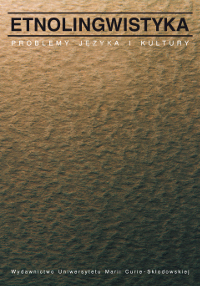Profilowanie stereotypu Rosjanina w polskim kręgu językowo-kulturowym
THE PROFILING OF THE STEREOTYPE OF A RUSSIAN IN THE REALM OF POLISH CULTURE AND LANGUAGE
Author(s): Irina LappoSubject(s): Anthropology, Language and Literature Studies, Applied Linguistics
Published by: Wydawnictwo Naukowe Uniwersytetu Marii Curie-Sklodowskiej
Keywords: the stereotype of a Russian in Poland; the Lublin school conception of the profiling of notions; public discourse; ordinary thinking; the “brother - enemy” profile; the “Slav - Asian” profile
Summary/Abstract: Contrary to popular belief, the stereotype of a Russian in Poland is not exclusively negative. The analysis presented in this article — also partially used in the article by Bartmiński, Lappo and Majer-Baranowska in the present volume — follows the Lublin conception of profiling and allows one to reconstruct various profiles of the image of a Russian present in Polish public discourse and ordinary thinking. The profiles arise out of base features established in the Polish tradition relative to the assumed perspectives and points of view.The most frequent profile of a Russian is built on the basis of an image of someone with the „Russian soul”, characterized by the lack of restraint, excessive drinking, a pinch of unpredictable recklessness, openness, cordiality, hospitality, love of partying, perserverence, stubbornness, as well as the syndrome of „Asianness”: the mentality of a slave, wildness, civilizational backwardness and hypocrisy. It. is the model of a „brother- enemy”, a Slav-Asian, the most frequent one.The most negative variant is built from the perspective of a Polish citizen and patriot subjected to national, ideological and political repression. This is the profile of a Russian „master”, representing a hostile Empire and participating in despotic and totalitarian mechanisms of wielding power.Among the Polish intelligentsia, there exists the profile of a „Moscovite-friend” (following Mickiewicz). In this view the Russian good (e.g. culture) is kept distinct from the Russian evil (i.e. the political system), a Russian — especially a member of the Russian intelligentsia — being seen as someone close and spiritually rich.The weakest one is a newly arising profile of a Russian-European, found among young educated Poles, who share the common canon of basic values (the knowledge of English, computer skills, the love of McDonald’s, globalization, etc.).
Journal: Etnolingwistyka. Problemy Języka I Kultury
- Issue Year: 14/2002
- Issue No: 14
- Page Range: 153-174
- Page Count: 22
- Language: Polish

